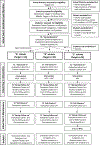"Wellness Champions for Change," a multi-level intervention to improve school-level implementation of local wellness policies: Study protocol for a cluster randomized trial
- PMID: 30342257
- PMCID: PMC6594543
- DOI: 10.1016/j.cct.2018.10.008
"Wellness Champions for Change," a multi-level intervention to improve school-level implementation of local wellness policies: Study protocol for a cluster randomized trial
Abstract
Schools are a recommended place for childhood obesity prevention. Local Wellness Policies (LWPs) establish guidelines for schools to provide opportunities for students to access nutritious foods and be physically active. Little is known about the impact of LWPs, when implemented, on students' behavior and body mass index (BMI). The Wellness Champions for Change trial assesses the student-level impact of providing theory-based training and technical assistance to help schools implement LWPs. This 3-arm, cluster randomized controlled trial will take place in 30 low- or middle-income schools (15 elementary and 15 middle) in five Maryland school districts. Ten schools will receive both Wellness Champions for Change (WCC), which involves training teacher-led wellness teams, and Wellness Champions for Change-Student (WCC-S), which engages students as wellness team members. Ten schools will receive WCC only, and ten control schools will receive a delayed intervention. The RE-AIM framework will guide evaluation. Student Effectiveness measures will include BMI z-scores, self-reported diet patterns, and objectively-measured physical activity. The sample size (1080 students across 30 schools, followed for 2.5 years) will enable power (>0.8) to detect BMI z-score differences. A three-level linear mixed model that accounts for clustering will be used to assess Effectiveness. A mixed methods approach will assess school- and district-level Reach, Adoption, and Implementation. If effective, this approach will represent a sustainable, multi-level, school-based strategy to prevent childhood obesity. The evaluation framework will allow for the description of factors necessary to broadly disseminate this approach for obesity prevention on a large scale.
Keywords: Child/adolescent; Childhood obesity prevention; Healthy eating; Local Wellness Policies; Physical activity; School-based obesity intervention.
Copyright © 2018 Elsevier Inc. All rights reserved.
Figures



References
-
- Skinner AC, Perrin EM, Skelton JA. Prevalence of obesity and severe obesity in US children, 1999–2014. Obesity 2016;24(5):1116–1123. - PubMed
-
- Brofenbrenner U Ecological Models of Human Development 2nd ed. Oxford: Elsevier; 1994.
-
- Summerbell CD, Waters E, Edmunds LD, Kelly S, Brown T, Campbell KJ. Interventions for preventing obesity in children. The Cochrane Database of Systematic Reviews 2005(3):Cd001871. - PubMed
-
- Wechsler H, Devereaux RS, Davis M, Collins J. Using the school environment to promote physical activity and healthy eating. Preventive Medicine 2000;31(2):S121–S137.
Publication types
MeSH terms
Grants and funding
LinkOut - more resources
Full Text Sources
Medical

